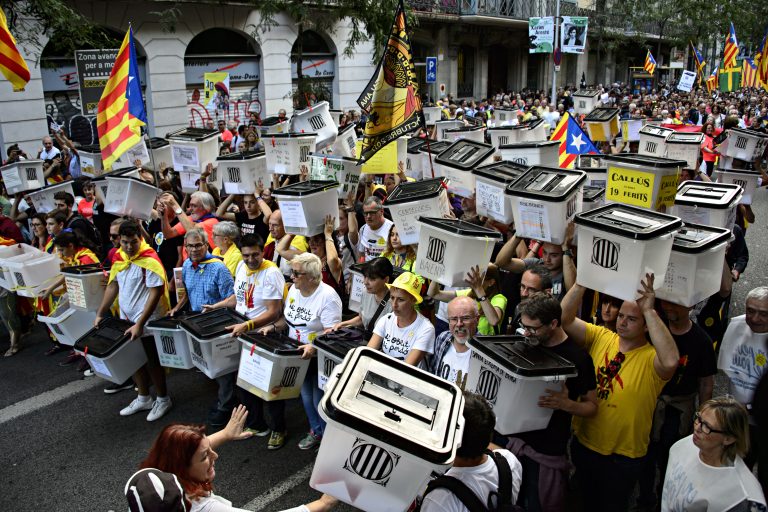
For the first time after more than 50 years I am standing again in a prison. The previous time it was due to being arrested in Szczecin, Poland. Then, I was arrested while I was talking to three or four beggars standing at the entrance of a church. But, of course, as everyone knows, there were no beggars in the East Communist Europe. Therefore, I was in the wrong place. I spent a few hours in prison accompanied by a mix of pickpockets and common criminals. They did not hurt me. I was Danish, and therefore, untouchable.
The other day I went to the prison of Lledoners, in Catalonia. In Lledoners the government in Madrid holds prisoners seven political non-violent leaders freely elected by the citizens. Four of them have started a hunger strike to protest against the slowness of the Spanish judicial system. I was assigned 45 minutes with Raül Romeva, a former Member of the European Parliament later former Counsellor of Foreign Affairs of Catalonia.
Together with Francesca we drive from Barcelona towards the blue sky on the horizon, through small towns and cities decorated with yellow ribbons. This symbol is everywhere. It is in solidarity with the seven men in Lledoners and the two women –former president of the Catalan Parlament Carme Forcadell and the former Counsellor of Labour, Social Affairs and Families also prisoners in two other prisons – all of them threatened with sentences of prison that go up to 25 years.
In front of Lledoners, hundreds of people wait their turn to visit. In our route, there are many metal doors and security locks that are opened and closed as we go. After we have crossed the inner courtyard surrounded by a wall that is about six meters tall, we get to the visitors area and we find our visitation booth. Romeva, who has been in prison for almost a year, is waiting for us. He hasn’t killed or defrauded nobody, he just has a different political opinion to the one in Madrid: that Catalonia, that was conquered by Spain in the 18th century has the right to be a normal European Republic, free of the Spanish corrupt and oppressive regime.
We greet, our palms touching each side of the shatter-proof glass that separate us. In the visitation booth next to ours I see Jordi Sànchez and Jordi Turull with their thumbs up. Today they have started an indefinite hunger strike.
Through the phone in the visitation booth, Romeva tells me “We are stronger by the day. Spain’s foolishness helps us. The Catalan people are with us. This encourages us. We want a European democracy, European freedom, human rights, modernity, everything that the Spanish state is denying to us. We need a referendum supervised internationally”. In Lledoners many inmates admire the political prisoners. “We don’t want any privilege” says Romeva. “We clean, we take turns in the kitchen, we are treated like any other inmate and so it should be”. Romeva gives sports classes to other inmates. The former Vice President Junqueras gives history classes.
As I write this article, two more former counsellors Joaquim Forn and Josep Rull have joined the hunger strike. The prisoners are protesting against the standstill of their complaints to the Constitutional Court, that is in the knowledge that only when the prisoners have a definitive sentence from this Court, can they go to the European Court of Human Rights. It is expected that Spain’s miserable intervention will turn against it with an unbearable international condemnation.
As we return to the courtyard, new metal doors and more security locks. As I leave the prison, men and women hug me. I am feeling faint; am I in Uzbekistan or in Europe? Where are Løkke Rasmussen and Anders Samuelsen? These prisoners are our true democrats, they are the new Vaclav Havel, Lech Walesa and the thousands of unknown people in the Central Communist Europe in the past, the Gandhis of India and the Nelson Mandela of South Africa.
The future belongs to them, not to their oppressors.
Per Nyholm, Jyllands-Posten (8/12/2018)